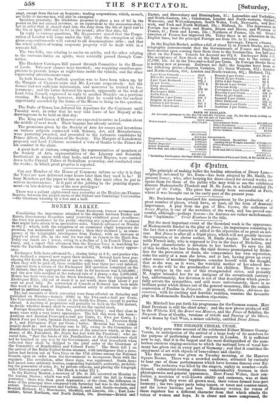But the most important event of the theatrical week is
the appearance of Mademoiselle Rachel in the play of Diane; its importance consisting in the fact that a new character is added to the repertoire of so great an act- ress. But Diane is after all a frigid piece, which will not greatly increase the reputation of its clever author, M. Emile Augier. The heroine is a noble French lady, who is supposed to live in the days of Richelieu, and her great characteristic is devotion to her brother. To save the life of this brother, who has broken the rigid decrees promulgated by Riche- lieu for the prevention of duels, she compromises her own reputation, risks the safety of a man she loves, and at last, having given up every other source of mundane happiness, consoles herself with the thought, that as she was, as it were, the watchful mother of her adored bro- ther, so she will be the grandmother of his children. There is some- thing antique in the cast of this strongminded sister, and probably M. Augier intended her for an Antigone of the seventeenth century ; but, unfortunately, her devotion is not of that description which power- fully arrests the sympathies, and still more unfortunately, there is no brilliant point which shines out of the general monotony, like the sudden conversion of Pauline in Tolyeacte. At present, therefore, Adrienne Le- couvreur, with its exciting and horrible realities, remains the favourite play in Mademoiselle Rachel's modern repertoire.
























 Previous page
Previous page